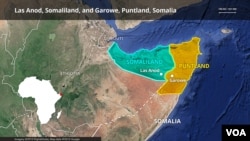Security forces in Somalia's breakaway republic of Somaliland on Thursday withdrew from the contested border town of Las Anod after days of deadly protests. The town is claimed by Somalia's Puntland State but run by Somaliland, which broke from Somalia in 1991. Anti-government protests erupted there last week after a politician was shot dead, leading to clashes with police in which at least eight other people were killed.
Las Anod Mayor Abdirahim Ali told VOA calm returned to the town Thursday after traditional leaders called on all sides to maintain peace as Somaliland withdrew troops.
He says the troops stationed in the town were instructed by their commanders to withdraw and return to their previous stations. Ali says elders, the business community, and everyone who supports security and peace in Las Anod have agreed to work together to restore the peace that once existed in this town.
Somaliland deployed troops to the disputed border town after deadly clashes broke out last week between anti-government protesters and police.
The protests were sparked by the shooting death of a local politician and escalated Wednesday when a shopkeeper was shot dead.
Medical sources in Las Anod told VOA at least 15 people were killed in the fighting over the past week but Dr. Abdirahim Warfa, who works in the town's main public hospital, recorded only eight deaths.
Somalia's Puntland State claims Las Anod, which is controlled by Somaliland, a northern territory that broke away from Somalia in 1991.
Somaliland is self-governed and more stable than Somalia, but not recognized internationally as a country.
Hassan Sheikh, a political analyst at Somali National University, said people in La Anod identify more with Somalia than Somaliland.
Political grievances are a major part of the Las Anod violence, he said, because people lack representatives in the bodies of government that correspond to their social, economic, and territorial groups.
Abdiwahab Sheikh Abdisamad, director of the Nairobi-based HORN International Institute for Strategic Studies, said Somaliland has failed to convince Las Anod's population to support its breaking away from Somalia.
He said in the fifteen years since Somaliland's administration was established in Las Anod aren't convinced that Somaliland's project to split them from the rest of Somalia is viable, since the population does not favor it. Abdisamad said to persuade them, Somaliland tried to use force, which is impossible.
Somaliland army commanders said they withdrew from the town to avoid further escalation but said they would prevent further instability.
Sheikh said the uprising that occurred in Las Anod could lead to others and spread from town to town. He said that could negatively impact Somaliland's political goal, which is to secede from Somalia.
Somaliland President Muse Bihi on Wednesday dismissed concerns about the deadly unrest, calling it an "incidental clash between the police and the people."
Bihi promised an investigation into the violence but also declared a readiness to defend the territory if neighboring Puntland declared war.
Somaliland and Puntland have a history of disputes over their border areas that occasionally turn violent.
While Somaliland is relatively stable, it has seen protests in recent months that turned violent and raised international concerns.
In August, clashes between police and opposition supporters over delayed elections saw at least five people killed and scores injured.




